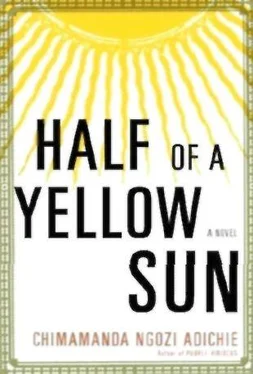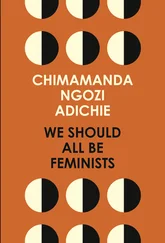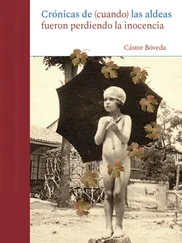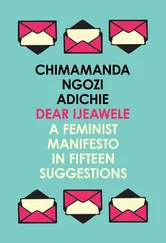"What are you writing now?" he asked.
"A small thing, sah," Ugwu said.
"I'll stay with Ugwu," Baby said.
"Okay, Baby." Richard knew that she would hurry to the classrooms to find some of the children and begin hunting for lizards or crickets. Or she would look for the self-styled militiaman who wore a dagger round his waist and ask if she could hold it. He walked back to the house. Odenigbo had just returned from work and, in the bright evening sun, his shirt was worn so thin in front that Richard could see the curled hair on his chest.
"Is Kainene back?" Odenigbo asked.
"Not yet."
Odenigbo gave him a long accusing glance before he went inside to change. He came back out with a wrapper slung around his body and tied behind his neck and sat with Richard in the living room. On the radio, His Excellency announced that he was going abroad to search for peace.
In accord with my own frequent affirmations that I would personally go anywhere to secure peace and security for my people, I am now traveling out of Biafra to explore…
The sun was falling when Ugwu and Baby came home.
"That small child, Nneka, just died and her mother has refused to let them take the body and bury" Ugwu said, after he greeted them.
"Is Kainene there?" Richard asked.
"No," Ugwu said.
Odenigbo got up and Richard got up and they walked down to the refugee camp together. They said nothing to each other. A woman was wailing from one of the classrooms. They asked questions and everyone said the same thing: Kainene had left with Inatimi early in the morning. She told them she was going on afia attack, to trade across enemy lines, and that she would be back by late afternoon.
A day passed, then a second day. Everything remained the same, the dryness in the air, the dusty winds, the refugees tilling dried soil, but Kainene was not back. Richard felt himself tumbling through a tunnel, felt the weight being sucked off him hour after hour. Odenigbo told him Kainene was probably just held up on the other side, waiting for the vandals to move before she came home. Olanna said this delay happened all the time to women who did the attack trade. But there was, in Olanna's eyes, a furtive fear. Even Odenigbo looked fearful when he said he would not go with them to search for Kainene because he knew she would come home; it was as if he was afraid of what they would discover. Olanna sat beside Richard as he drove to Ninth Mile. They were silent, but when he stopped to ask people on the roadside if they had seen anybody who looked like Kainene, she would say, "O tolu ogo, diezigbo oji"; as if repeating what Richard had already said, that Kainene was tall and very dark, would jog the people's memory better. Richard showed them Kainene's picture. Sometimes, in his rush, he pulled out the picture of the roped pot instead. Nobody had seen her. Nobody had seen a car like Inatimi's. They even asked the Biafran soldiers, the ones who told them they could not go any farther because the roads were occupied. The soldiers shook their heads and said they had not seen her. On the drive back, Richard began to cry.
"Why are you crying?" Olanna snapped at him. "Kainene is just stuck on the other side for a few days."
Richard's tears blinded him. He veered off the road and the car screeched as it ran into the thick undergrowth of the bush.
"Stop! Stop!" Olanna said.
He stopped and she took the key from him and went around and opened his door. As she drove them home, she hummed steadily under her breath.
Olanna ran the wooden combthrough Baby's hair as gently as she could, and yet there was a large tuft left on the teeth. Ugwu was sitting on a bench writing. A week had passed and Kainene was not back. The harmattan winds were calmer today, they did not make the cashew trees swirl, but they blew sand everywhere and the air was thick with grit and with rumors that His Excellency had not gone in search of peace but had run away. Olanna knew it could not be. She believed, as firmly and as quietly as she believed that Kainene would come home soon, that His Excellency's journey would be a success. He would come back with a signed document that would declare the war over, that would proclaim a free Biafra. He would come back with justice and with salt.
She combed Baby's hair, and again some of it fell out. Olanna held the thin wisps in her hand, a sun-bleached yellow-brown that was nothing like Baby's natural jet-black. It frightened her. Kainene had told her some weeks back that it was a sign of extreme wisdom, Baby's hair falling off at only six years old, and afterward Kainene had gone out to look for more protein tablets for Baby.
Ugwu looked up from his writing. "Maybe you should not braid her hair, mah."
"Yes. Maybe that's why it's falling out, too much braiding."
"My hair is not falling out!" Baby said, and patted her head.
Olanna placed the comb down. "I keep thinking about the hair on that child's head I saw on the train; it was very thick. It must have been work for her mother to plait it."
"How was it plaited?" Ugwu asked.
Olanna was surprised, at first, by the question and then she realized that she clearly remembered how it was plaited and she began to describe the hairstyle, how some of the braids fell across the forehead.
Then she described the head itself, the open eyes, the graying skin. Ugwu was writing as she spoke, and his writing, the earnestness of his interest, suddenly made her story important, made it serve a larger purpose that even she was not sure of, and so she told him all she remembered about the train full of people who had cried and shouted and urinated on themselves.
She was still speaking when Odenigbo and Richard came back. They were walking; they had left in the Peugeot early in the morning to go and search for Kainene in the hospital in Ahiara.
Olanna sprang up. "Did you?"
"No," Richard said, and walked inside.
"Where is the car? Did the soldiers take it?"
"The fuel finished on the road. I will find fuel and go back and get it," Odenigbo said. He hugged her. "We saw Madu. He said he is certain she is still on the other side. The vandals must have blocked the way she had gone in and she is waiting for a new route to open. It happens all the time."
"Yes, of course." Olanna picked up the comb and began to untangle her own matted hair. Odenigbo was reminding her that she should be grateful that they had not found Kainene in hospital. It meant Kainene was well, only on the Nigerian side. And yet she did not want him to remind her. Days later, when she insisted on searching the mortuary, he told her the same thing, that Kainene had to be safely on the other side.
"I will go," she said. Madu had sent them some garri and sugar and a little fuel. She would drive herself.
"There's no point," Odenigbo said.
"No point? There is no point in looking for my sister's body?"
"Your sister is alive. There is no body."
"Yes, God."
She turned to leave.
"Even if they shot her, Olanna, they would not take her to a mortuary inside Biafra," Odenigbo said, and she knew he was right but she hated him for saying it and for calling her Olanna instead of nkem and she went anyway, to the foul-smelling mortuary building, where bodies from a recent bombing were piled up outside, swelling in the sun. A crowd of people was begging to be let in to search.
"Please, my father is missing since the bombing."
"Please, I cannot find my small girl."
Olanna's note from Madu made the caretaker smile at her and let her in and she insisted on looking at the face of every female body, even those that the caretaker said were too old, and afterward she stopped on the road to vomit. If the sun refuses to rise, we will make it rise. The title of Okeoma's poem came to her. She did not remember the rest of it, something about placing clay pot on top of clay pot to form a ladder to the sky. Back home, Odenigbo was talking to Baby. Richard sat staring at nothing. They did not ask her if she had found Kainene's body. Ugwu told her that there was a large palm-oil-colored stain on her dress, his voice low, as if he knew it to be the remnants of her own vomit. Harrison told her there was nothing to eat and she stared at him blankly because it was Kainene who had been in charge of things, who knew what to do.
Читать дальше












